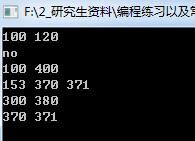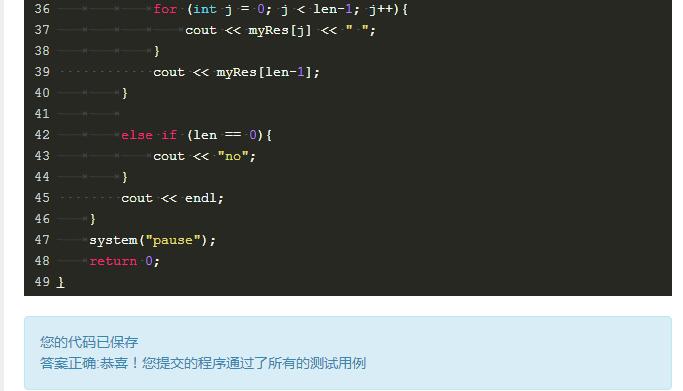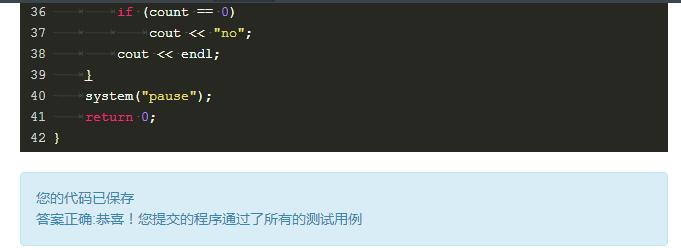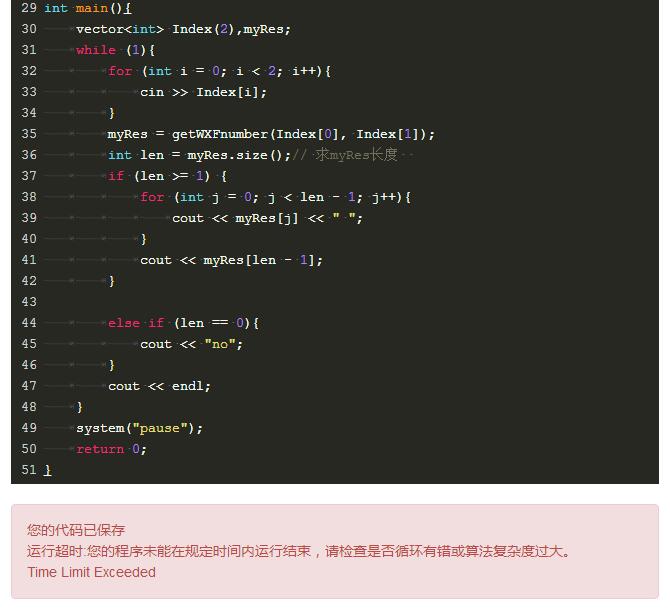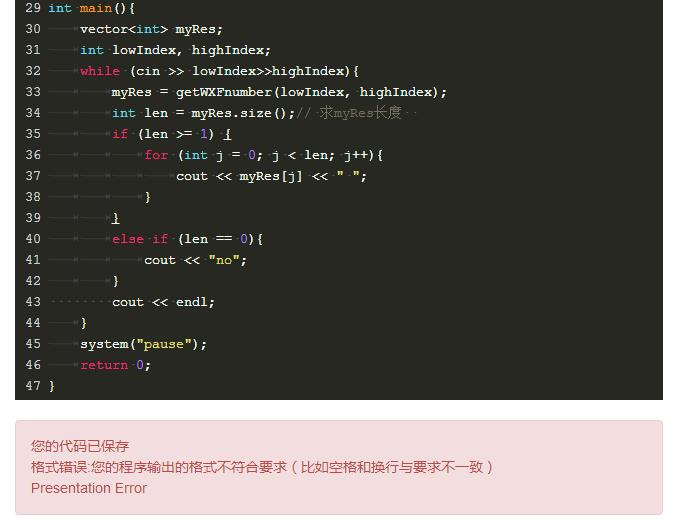在线编程——水仙花数(python&C++)
在线编程——水仙花数(python&C++)
题目地址:水仙花数——牛客网
水仙花数的数学定义:
水仙花数(Narcissistic number)也被称为超完全数字不变数(pluperfect digital invariant, PPDI)、自恋数、自幂数、阿姆斯壮数或阿姆斯特朗数(Armstrong number),水仙花数是指一个 n 位数(n≥3 ),它的每个位上的数字的 n 次幂之和等于它本身(例如:1^3 + 5^3+ 3^3 = 153)。
题目描述
春天是鲜花的季节,水仙花就是其中最迷人的代表,数学上有个水仙花数,他是这样定义的: “水仙花数”是指一个三位数,它的各位数字的立方和等于其本身,比如:153=1^3+5^3+3^3。 现在要求输出所有在m和n范围内的水仙花数。
输入描述:
输入数据有多组,每组占一行,包括两个整数m和n(100 ≤ m ≤ n ≤ 999)。
输出描述:
对于每个测试实例,要求输出所有在给定范围内的水仙花数,就是说,输出的水仙花数必须大于等于m,并且小于等于n,如果有多个,则要求从小到大排列在一行内输出,之间用一个空格隔开; 如果给定的范围内不存在水仙花数,则输出no; 每个测试实例的输出占一行。
示例1
输入
100 120 300 380
输出
no 370 371
python代码:
# coding = utf-8
import sys
def getWXFnumber(num1, num2):
res = []
if num1 < 0 or num2 > 999:
return 0
if num1 >= 0 and num2 <= 999:
for i in range(num1, num2 + 1):
tmp = []
if len(str(i)) < 3 or len(str(i)) > 3:
continue
for j in range(len(str(i))):
tmp.append(i // pow(10, j) % 10)
getSum = pow(tmp[0], 3) + pow(tmp[1], 3) + pow(tmp[2], 3)
if getSum == i:
res.append(i)
del tmp
return res
if __name__ == '__main__':
try:
while True:
arr1 = [int(t) for t in sys.stdin.readline().split()]
res1 = getWXFnumber(arr1[0], arr1[1])
if len(res1) >= 1:
print(" ".join(str(i) for i in res1))
if len(res1) == 0:
print("no")
except:
pass运行结果:
总结:
1、以上运行环境为python3,若为python2,则需要在代码开头添加
# coding:utf-8 #与 # coding = utf-8等价2、输入的其他等价方法:
(1)python2:
# coding = utf-8
arr1 = [int(t) for t in raw_input("").split()](2)python3
arr1 = [int(t) for t in input("").split()]C++代码1:
#include
#include
#include
using namespace std;
//求一个整数是几位数
int getNumberLength(int num){
int length = 0;
while (num){
num /= 10;
length++;
}
return length;
}
//求区间[lowIndex,highIndex]的水仙花数
vector getWXFnumber(int lowIndex, int highIndex){
vector res;
if (lowIndex < 0 || highIndex>999) return res;
else if (lowIndex >= 0 && highIndex <= 999){
for (int i = lowIndex; i < highIndex + 1; i++){
vector tmp;
int len = getNumberLength(i);
if (len != 3)//求一个整数的长度
continue;
for (int j = 0; j < len; j++){
int val = i / pow(10, j);
tmp.push_back(val % 10);
}
int sum = pow(tmp[0], 3) + pow(tmp[1], 3) + pow(tmp[2], 3);
if (sum == i){
res.push_back(i);
}
tmp.clear();
}
return res;
}
}
int main(){
vector index(2),myRes;
while (1){
for (int i = 0; i < 2; i++){
cin >> index[i];
}
myRes = getWXFnumber(index[0], index[1]);
int len = myRes.size();// 求myRes长度
if (len >= 1) {
for (int j = 0; j < len; j++){
cout << myRes[j] << " ";
}
cout << endl;
}
else{
cout << "no" << endl;
}
}
system("pause");
return 0;
} 运行结果:
但是提交结果:
经分析,主要问题在于主函数,因此需要改进,这里提供3个改进版本:
C++代码1改进版(仅改主函数):
#include
#include
#include
using namespace std;
//求一个整数是几位数
int getNumberLength(int num){
int length = 0;
while (num){
num /= 10;
length++;
}
return length;
}
//求区间[lowIndex,highIndex]的水仙花数
vector getWXFnumber(int lowIndex, int highIndex){
vector res;
if (lowIndex < 0 || highIndex>999) return res;
else if (lowIndex >= 0 && highIndex <= 999){
for (int i = lowIndex; i < highIndex + 1; i++){
vector tmp;
int len = getNumberLength(i);
if (len != 3)//求一个整数的长度
continue;
for (int j = 0; j < len; j++){
int val = i / pow(10, j);
tmp.push_back(val % 10);
}
int sum = pow(tmp[0], 3) + pow(tmp[1], 3) + pow(tmp[2], 3);
if (sum == i){
res.push_back(i);
}
tmp.clear();
}
return res;
}
}
int main(){
vector myRes;
int lowIndex, highIndex;
while (cin >> lowIndex >> highIndex){
myRes = getWXFnumber(lowIndex, highIndex);
int len = myRes.size();// 求myRes长度
if (len >= 1) {
for (int j = 0; j < len - 1; j++){
cout << myRes[j] << " ";
}
cout << myRes[len - 1];
}
else if (len == 0){
cout << "no";
}
cout << endl;
}
system("pause");
return 0;
} 运行结果如上,提交结果:
C++代码1改进版(不使用getNumberLength函数):
#include
#include
#include
using namespace std;
//求区间[lowIndex,highIndex]的水仙花数
vector getWXFnumber(int lowIndex, int highIndex){
vector res;
if (lowIndex < 0 || highIndex>999) return res;
else if (lowIndex >= 0 && highIndex <= 999){
for (int i = lowIndex; i <= highIndex; i++){
int tmp;
int value = i;
int sum = 0;
while (value > 0){
tmp = value % 10;
sum += pow(tmp, 3);//sum += tmp*tmp*tmp;
value /= 10;
}
if (sum == i){
res.push_back(i);
}
}
return res;
}
}
int main(){
vector myRes;
int lowIndex, highIndex;
while (cin >> lowIndex >> highIndex){
myRes = getWXFnumber(lowIndex, highIndex);
int len = myRes.size();// 求myRes长度
if (len >= 1) {
for (int j = 0; j < len - 1; j++){
cout << myRes[j] << " ";
}
cout << myRes[len - 1];
}
else if (len == 0){
cout << "no";
}
cout << endl;
}
system("pause");
return 0;
} 运行结果如上,提交结果:
C++代码2(方法——利用isDaffy函数判断当前数是否为水仙花数):
#include
#include
#include
using namespace std;
//判断一个数是否为水仙花数
bool isDaffy(int num){
int tmp;
int sum = 0;
int value = num;
while (value > 0){
tmp = value % 10;
sum += pow(tmp, 3); //等价于 sum += tmp*tmp*tmp;
value /= 10;
}
if (sum == num)
return true;
else
return false;
}
int main(){
int lowIndex, highIndex;
while (cin>>lowIndex>>highIndex){
int count = 0;
for (int j = lowIndex; j <= highIndex; j++){
if (isDaffy(j)){
if (count == 0)
cout << j;
else
cout << " " << j;
count++;
}
}
if (count == 0)
cout << "no";
cout << endl;
}
system("pause");
return 0;
} 运行结果如上,提交结果:
总结:
1、C++代码1改进版的主函数中,若换成向量方式输入,运行不通过!!!
int main(){
vector Index(2),myRes;
while (1){
for (int i = 0; i < 2; i++){
cin >> Index[i];
}
myRes = getWXFnumber(Index[0], Index[1]);
int len = myRes.size();// 求myRes长度
if (len >= 1) {
for (int j = 0; j < len - 1; j++){
cout << myRes[j] << " ";
}
cout << myRes[len - 1];
}
else if (len == 0){
cout << "no";
}
cout << endl;
}
system("pause");
return 0;
} 2、输出格式一定要注意:
300 380
370 371(后面无空格)
参考网址:
1、输出列表元素,以空格或逗号为分隔符:https://blog.csdn.net/yangnianjinxin/article/details/77127257
2、https://blog.csdn.net/cityzenoldwang/article/details/78621337

